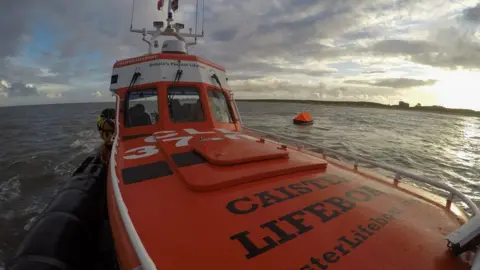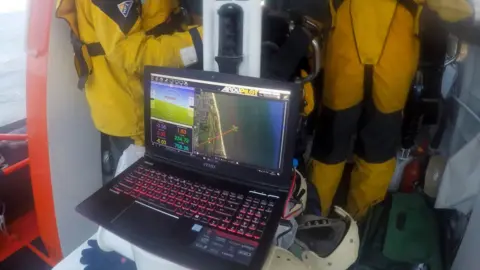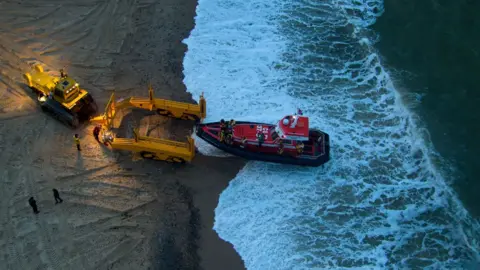Caister Lifeboat crew tests use of drones
An offshore lifeboat crew is testing the use of drones during search and rescue operations.
The independent offshore lifeboat service at Caister, Norfolk, has a fleet of drones, fitted with floodlights and cameras.
A spokesman said the devices would beam back live footage - visible on lifeboat screens.
Discussions are ongoing with the Civil Aviation Authority (CAA) about bringing the drones into regular use on rescues.
A CAA spokesman said permission could be granted in "certain circumstances for certain people", but that some safety issues needed to be worked through.
If a drone collided with a search and rescue helicopter, he said, the result could be "catastrophic".
"We absolutely want to support the use of drones as long as they're done safely, so the risk of harming people in the air is controlled," he said.
 PA/Sam Russell
PA/Sam RussellCaister Lifeboat is the only station in the UK to operate an offshore vessel independently of the RNLI.
The service covers a radius of 250 miles of the North Sea and has a crew of 30 volunteers.
As a registered charity, it relies entirely on public donations.
The drones were donated by an insurance firm which had the technology developed in 2016 to enhance street lighting.
Drone expert Peter King, who is supporting the lifeboat team at Caister, said using the drone as "an eye in the sky" was like "having multiple coastguard helicopters up at the same time."
He said: "Normally you're at sea level trying to look out from the lifeboat. The swell is above the boat so you have to wait until you're on the crest of a wave, and they might be in a trough.
"They might be 20m away and you still can't find them."
"Safety case"
CAA regulations cap the maximum legal range of a drone at 500m, but Mr King said he hoped to put forward a "safety case" for permission for the lifeboat drones to go further.
 PA/Sam Russell
PA/Sam RussellPaul Garrod, chairman of Caister Lifeboat, said: "In the past, there have been instances where we have been unsuccessful when searching for someone in need of help.
"Perhaps if we had been equipped with the drone technology, these searches would have had a positive outcome."
 PA/Sam Russell
PA/Sam Russell